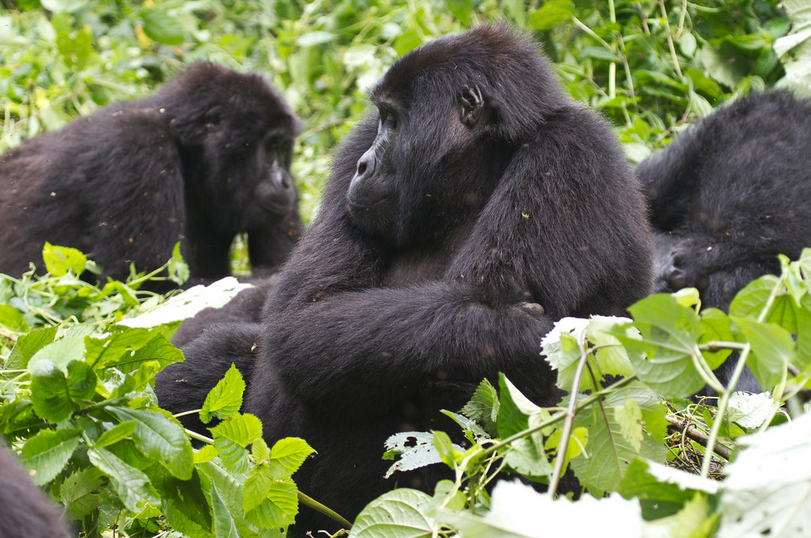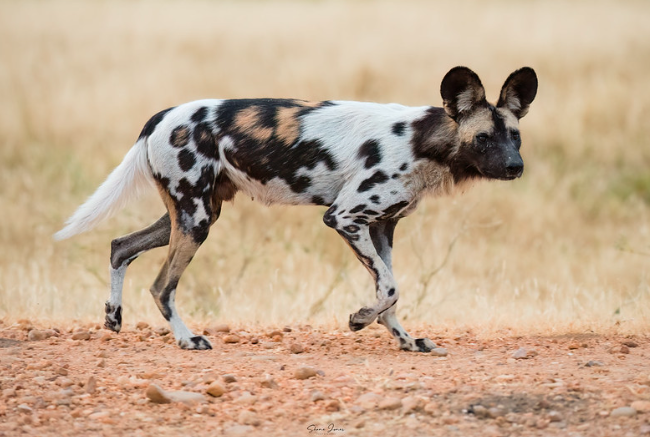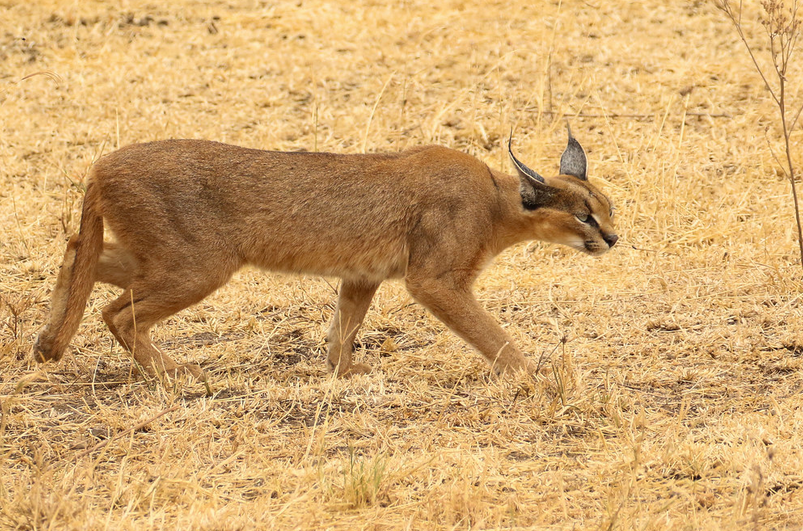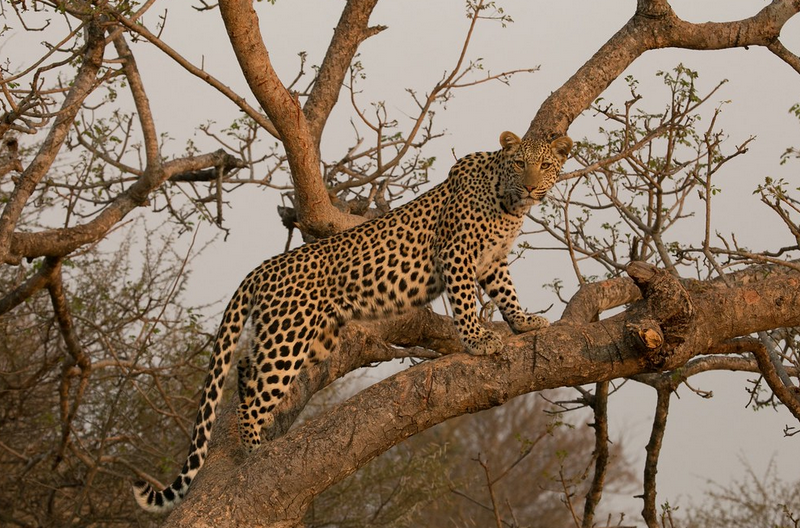The Batwa Culture
“The keepers of the forest”
Overview:
The Batwa Culture: In Uganda the Batwa or Twa people lived in harmony in the jungle with all creatures including the mountain gorillas thus named the “main gorilla trackers” until Bwindi Rain Forest was gazette as a national park, they lived a hunter gatherer lifestyle in the forest and here they were known as “the keepers of the forest”. The Batwa lived a lifestyle of gathering fruits, plants and hunting game in the forest using bows and arrows, this was mainly for both medical and food purposes. They roamed the forests for centuries in search of fruits and honey where they lived a harmonious life, they never practiced farming, no charcoal burning not even the shelters they had could destroy the environment but until they were evicted from their former home that’s when they started hunting gorillas, begging and working for others as servants.
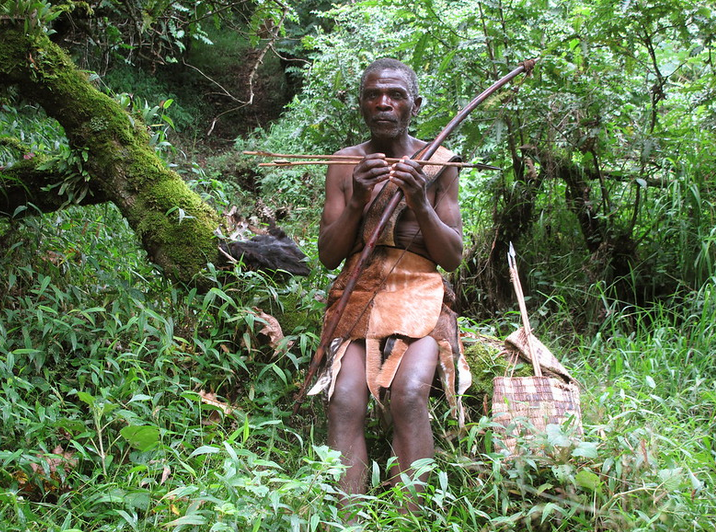
The Batwa Culture
What to see and enjoy
The Batwa spiritual beliefs and rituals
- Batwa people believe in a supreme being locally known as Nagaasan or Imaana. And it is believed that Nagaasan provides the wealth, food, protection and children to the Twa people. The chameleon was treated as sacred due to the fact it climbed to the highest point of the tree and the Twa believed that it came closest to God. The ancient religion of the Batwa is center on the forest and it is practiced by the different people in the community and even after the introduction of Christianity, some Batwa people still practice the old religion.
- When a baby was born among the Twa people, a bow and arrow was always placed in their palms as a sign of protection. The education system was not different from others as the children learnt the different activities like hunting and doing house chores from the elders instead of going to classes. The women also breastfed their babies for a very long time as this acted as a form of family planning for them.
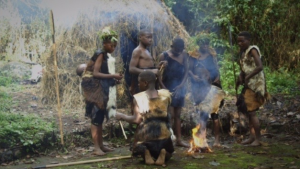
- The Twa practiced monogamy although sometimes they would exchange girls and this was known as barter marriage. Most of the marriages in the Twa were arranged by their respective families and in the case of the barter marriage, the two were made to face each other especially during the marriage ceremonies which was a sign of their shared future in marriage. After the marriage ceremony, the father of the bride always introduced her to the family of the spirits. And in case the woman was barren, the man was always encouraged to get another woman who could bear children for the continuity of his lineage. Non Batwa people cannot marry Twa people but the men who live around have always raped the Twa women with a belief that they will get cured of Aids.
- Adultery was also not allowed among the Twa people. Bride purchasing during marriages as is the norm now was not accepted but a few gifts were given to the family of the bride and these were wild meat and honey. The meat of the squirrel was the one mostly used since it was hard to hunt and during the marriage it was given to the mother in law.
- They hardly practiced inheritance ceremonies since the Twa people owned few possessions and upon death, the family members would be given the possessions to own. The dead were normally buried in huts or cremated and the place where they were buried was always abandoned. They were also buried in caves and rocks but this was before they were chased out of Bwindi forest for conservation. After the death of a beloved one, a medicine man would come by to cleanse the bereaved family members so that the spirit of the deceased would not attack them.
The social and economic life of the Batwa
- The Batwa live in small congested houses that are always too small to accommodate all the family members under one roof. You might find over eight people living in the same single roomed house and most of these houses do not have mattresses or sits but you find the family members lying on their sisal made beds at night.
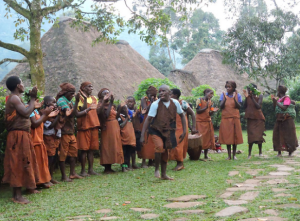
- The Batwa are very good people as they are welcoming and hospitable to the visitors. They socialize through hunting, music, dancing and different stories that are always told in the evening by the elders to the younger generation.
- The Twa marry when they are in their teens and this has drastically increased their population and yet they live on small pieces of land. Most of these drop out of school so that they help in the day to day running of the families while others become local guides for the tourists who visit the area for gorilla trekking.
- It is extremely hard for the Batwa people to get jobs and they end up doing casual jobs which do not bring in a lot of money. They also make clay pots that they sell to the different people who visit the area. Most of the people who design the pots say that although they sell these pots, the money they get is not enough to last them a week and sometimes they end up going hungry due to lack of food and the fact that their livelihood of hunting was take away from them, they are trying to adopt to the changing world.
- The children of the Twa go to school but most of them do not finish because of the extreme poverty that they face and they end up doing odd jobs to survive. Some of the children run away from schools because they are threatened by the teachers and fellow children.
In Uganda we have different Batwa Communities
- Batwa Culture Trail found in Mgahinga Gorilla Park; tourists who are interested in culture are led by Batwa locals through the jungle, they teach the tourists their ancient gathering and hunting ways and after the visit, Batwa guides head back to their community, the Batwa also receive some little money of the Batwa Trail fees, but tipping them is also accepted. The
- Batwa Experience in Buhoma found just outside Bwindi Impenetrable National Park, visitors enjoy this experience after trekking gorillas. This experience has greatly benefited the Batwa communities and visitors are introduced to the culture including traditional dances, clothing and food among others.
- Buninga Batwa Forest in Nkuringo; this gives chance to tourists to explore the cultural and traditional ways of the Batwa. Buninga forest is not part of Bwindi but its wildlife species, primates and vegetation types are similar to those in Bwindi and here visitors can also spot some chimpanzees during the forest walk. Batwa is a mazing indigenous group of people with excellent and interactive cultural experiences that one would not want to miss while visiting Uganda, therefore, it’s possible to enjoy Gorilla trekking and crown it with a visit in any of the Batwa Communities or have a visit in any of the walk with Batwa guides.
Below are some of our tours to different destinations in the Country
1 Day Chimpanzee Ngamba Island Tour
1 Day Source of the Nile Jinja
2 Days Murchison falls national park
3 Days Lake Mburo national park safari
3 Days Murchison falls national park
3 Days Queen Elizabeth national park
4 Days Kidepo savannah wildlife safari
5 Days Queen & Bwindi Adventure safari
6 Days Uganda wildlife & primate safari
7 Days Uganda Adventure Safari
8 Days Gorilla & Wildlife safari
10 Days Gorilla & Adventure safari
Request a Quote
Featured Tour Updates
Permit cost for gorilla trekking in Uganda
Permit cost for gorilla trekking in Uganda Permit cost for gorilla trekking in Uganda : Gorilla trekking is one...
The African Wild Dog
The African Wild Dog The African wild dog: (Lycaon pictus) also known as the African painted dog or Cape...
The Caracal (Felis caracal)
The Caracal (Felis caracal) The Caracal (Felis caracal): is a medium-sized wild cat that can run up to 50...
African Leopards (Panthera pardus)
African Leopards (Panthera pardus) African Leopards (Panthera pardus) : are one of the most feared but respected animals in...


